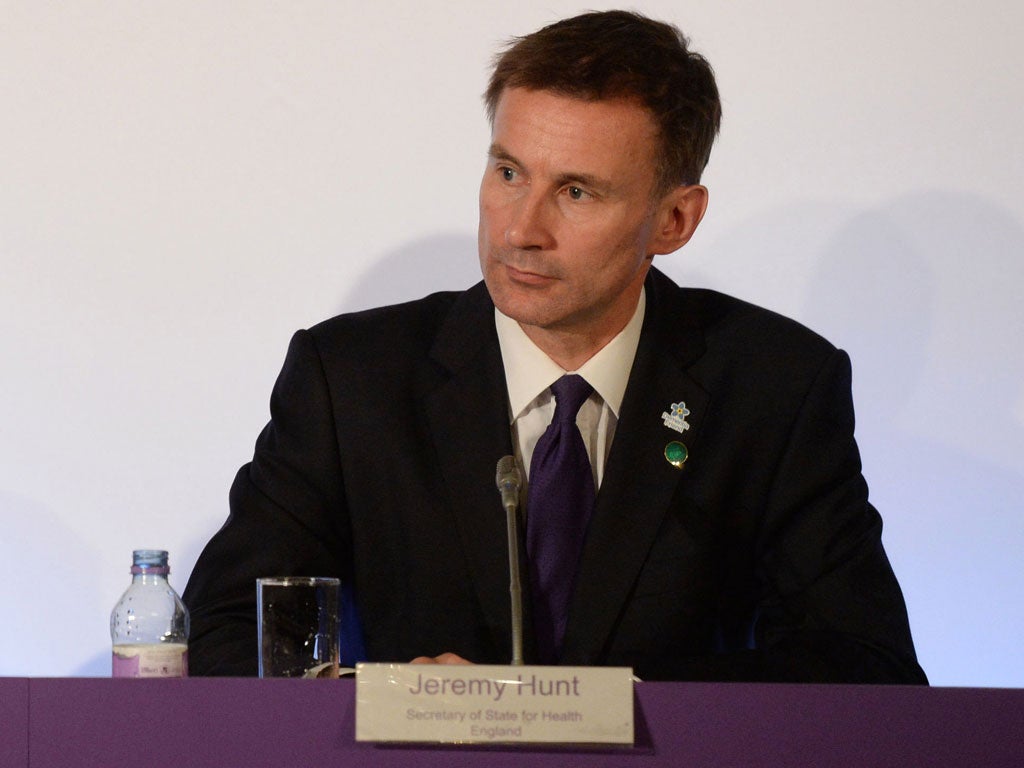2013 - the year in review: The year the NHS took a serious kicking
Jeremy Hunt positioned himself as a patients’ champion, shining a light on bad practice in the NHS

Your support helps us to tell the story
From reproductive rights to climate change to Big Tech, The Independent is on the ground when the story is developing. Whether it's investigating the financials of Elon Musk's pro-Trump PAC or producing our latest documentary, 'The A Word', which shines a light on the American women fighting for reproductive rights, we know how important it is to parse out the facts from the messaging.
At such a critical moment in US history, we need reporters on the ground. Your donation allows us to keep sending journalists to speak to both sides of the story.
The Independent is trusted by Americans across the entire political spectrum. And unlike many other quality news outlets, we choose not to lock Americans out of our reporting and analysis with paywalls. We believe quality journalism should be available to everyone, paid for by those who can afford it.
Your support makes all the difference.The NHS turned 65 in 2013. If it survives to celebrate 75 years, this anniversary will be remembered for one thing above all. It was, first and foremost, the year of the Francis Report, a review of catastrophic failures at the Mid Staffordshire NHS Trust. Robert Francis QC’s findings – which included that there had been a “disregard of the significance of the mortality statistics” – have hung like a shadow over the NHS all year.
The report set the tone for a year that has seen the NHS take a serious kicking. Critics lined up to condemn it as unsafe, inefficient and expensive. Its top official, Sir David Nicholson, announced his resignation after seven years at the helm.
All the while, the pressures on the health service have grown, even as its resources dwindle. The Chancellor may speak of “protecting the NHS budget” but annual spending increases are now so small as to represent a cut in real terms for an organisation that has a growing – and ageing – population to look after.
Indeed, the Government spent much of 2013 trying to prove that signs of pressure on the system – such as waiting times targets being missed at A&E wards – are not a consequence of austerity.
Instead, in his first year at the helm, the Health Secretary Jeremy Hunt positioned himself as a patients’ champion – shining a light on bad practice in the NHS and blaming Labour for not acting on it years ago.
It was also the year that the health reforms designed by Mr Hunt’s predecessor, Andrew Lansley, came into effect. They were costly, and occasionally disruptive, but in the long-term their main impact may be to open up the NHS to ever more private-sector influence. Andy Burnham, the shadow Health Secretary, maintains that the Government is only too pleased to see the NHS begin to stutter.
Whether or not he is on to something may be revealed as Nicholson’s replacement takes the helm in 2014. He is Tony Blair’s former health advisor Simon Stevens, a man who spent the past decade as a senior executive in one of America’s private healthcare giants, UnitedHealth.
Further afield, 2013 provided a chilling reminder of the importance of modern medicine that put wranglings over the NHS into perspective. In Syria, where a 21st century healthcare system has all but collapsed, we saw the return of polio for the first time since 1999.
Join our commenting forum
Join thought-provoking conversations, follow other Independent readers and see their replies
Comments